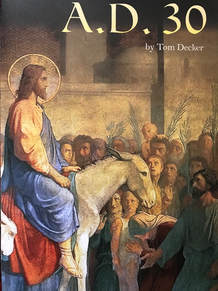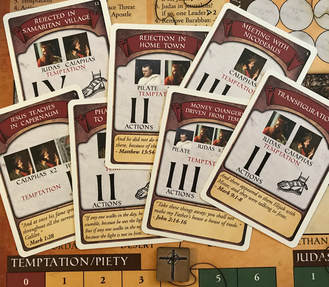 I am a non-religious person with a Ph.D. in Ancient Christianity. This means that, while I lack actual religious faith, I love things that have to do with Christianity. I spend my free time reading the works of Church Fathers. If there is a tchotchke that has a saint on it, I want it. (This is probably why I own a Coptic monk puppet, a Virgin Mary bottle opener, and a small glow-in-the-dark baby Jesus.) Since I am also a board game enthusiast, I had to add A.D. 30 to my collection. A.D. 30, published in 2012 by Victory Point Games, is a solitaire game in which you manipulate the movements of Jesus and his enemies—Caiaphas, Herod, Pilate, and Judas—to orchestrate Jesus' triumphant entry into Jerusalem and to ensure that his betrayal and crucifixion come to pass. You work through a deck of event cards and take actions to ensure that Jesus does not fall into temptation, that he recruits all twelve apostles (if possible), and that his political opponents do not reach Jerusalem before he does. For the record, A.D. 30 treats its subject matter with respect. Tom Decker, the game’s designer, states in his design notes that he wants to “demonstrate to the player the extraordinary set of circumstances that actually took place and were necessary to achieve the historical result and engender the birth of Christianity.” His game includes fourteen different possible outcomes of Jesus’ ministry, ranging from the story we know today to “Satan successfully lures Jesus into temptation and spreads Darkness over the world.” I am more than willing to play a game in which Darkness takes over the world—after all, I face this outcome in H.P. Lovecraft games all the time. But the fact that this game is about Jesus makes this outcome especially uncomfortable for a lot of gamers. Some reviewers keep their focus on whether a game is fun. Ricky Royal, a connoisseur of solitaire games, comments: “For me, a history buff, I’ll happily see it as a game design first, a history lesson second, and anything beyond that is not relevant to this forum.” Others, including Tom Vasel from The Dice Tower, are uncomfortable with several aspects of the game design. In his video review, Vasel objects to the idea of playing as Jesus and especially to the idea that Jesus was at risk of falling into temptation. For me, the temptation cards were the most interesting aspect of the game. (The gameplay itself is just okay.) Within the context of A.D. 30, temptation cards ostensibly represent moments in Jesus' life that Decker viewed as moments of vulnerability for Jesus when he designed the game. When Jesus is located in the desert, he is automatically affected by temptation because that is where he encounters Satan in the Gospels. But there are also events in the Jesus story, as told by the game, that tempt him as you play. These include:  - Teaching in Capernaum (flavor text: "And at once his fame spread everywhere throughout all the surrounding region of Galilee"). - Driving the moneychangers from the temple in Jerusalem - Jesus' meeting with the Pharisee Nicodemus - Jesus' rejection in his hometown - Jesus' rejection in the Samaritan village - The Transfiguration (Elijah and Moses appear and talk to Jesus, Jesus becomes radiant, and a voice in the sky calls Jesus "son") - Pharisees seek to stone Jesus (this event is mentioned in the context of the resurrection of Lazarus) I don't know for sure what Tom Decker was trying to say with his game design choices about temptation. In fact, this is an issue he skirts around in his design notes by saying, “if managed properly, Satan and temptation should not be a serious threat.” But I think that the temptation cards not only invite players to imagine Jesus as a man who experienced temptation, but also to contemplate how events in his life would have made him feel. Some of these events have to do with Jesus' fame or success, and thus possibly his ego. Teaching in Capernaum makes him famous, and his Transfiguration could perhaps be read as ego-inflating. Other events might make Jesus angry, such as his encounter with the moneychangers in the temple and the rejection he faces in his own hometown. A.D. 30 also elegantly reminds us that a game is never just a game—it’s a representation of how we understand and interact with the world. If you believe that Jesus was fully divine and unable to succumb to temptation, this game not only contradicts your beliefs, but forces you to be an active participant in their subversion. When designers create games, they offer an interpretation of the world whether they mean to or not. When you play a game, you at least partially accept the designer’s vision, whether you mean to or not. Because games require your participation instead of merely your attention, they communicate more viscerally than any other medium I can think of. It’s something you don’t think about much when you’re slaying zombies or building spaceships, but it’s there. It just takes a game like A.D. 30 to bring it into sharper relief.
2 Comments
Katarzyna
6/1/2018 06:05:33 am
Saint father Kolbe said that there are many churches but only one church was founded by Christ himself - catholic church.
Reply
SangDragon
7/28/2018 02:42:38 pm
If the concept of temptation is for you absurdal concerning the Absolute, then why was Jesus tempted in the desert ? for educationnal purposes only ?
Reply
Your comment will be posted after it is approved.
Leave a Reply. |
AuthorMy name is Liz Davidson, and I play solo board games. A lot of solo board games... Archives
August 2021
Categories
All
|
 RSS Feed
RSS Feed